Does Taipei really need another luxury department store? This was my first thought when my editor asked for a review of the food court in the basement of the recently opened Uni-President Hankyu Department Store (統一阪急百貨), located next to the Taipei City Hall MRT Station (市政府捷運站).
With Shin Kong Mitsukoshi (新光三越), Breeze Center (微風廣場), Sogo (太平洋崇光百貨) and Living Mall (京華城) — to name some of the luxury department stores that have opened in the capital’s East District (東區) over the past decade — Taipei’s shopping scene isn’t in want of high-end palaces devoted to consumption. Still, Taiwan’s Uni-President teamed up
with Japan’s Hankyu Hanshin Department Stores to open Hankyu. Will it
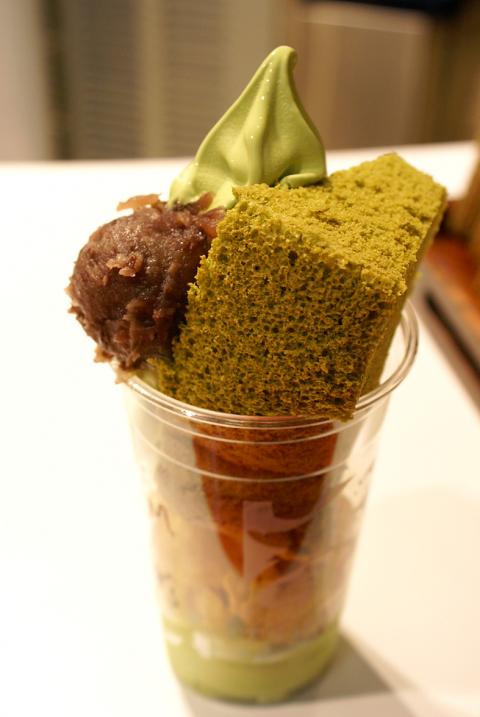
Photos: Noah Buchan, Taipei Times
increase consumer desire or create an anti-shopping backlash?
Almost certainly the former. Walking, or jostling, my way into the seven-story store on Thursday at 3pm, a week after it opened on Oct. 7, I scrambled past hordes of shoppers taking advantage of discounts offered until the end of this month. Upon entering the B2 food court area I was faced with a crowd so daunting, I escaped to the relative tranquility of the MRT station.
The multitudes of people hadn’t diminished by the following Monday. “Doesn’t anyone in Taipei have a job?”
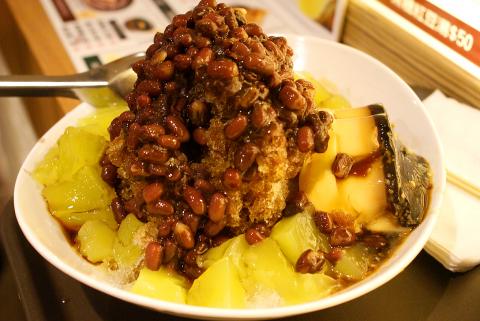
Photos: Noah Buchan, Taipei Times
I thought.
I again forced my way through the food court, which plays heavily on Japanese and Taiwanese culinary themes.
The center of the L-shaped space features dessert shops — including Mister Donut, Mydori and the popular Japanese chain store Tsujiri — that share space with Taiwanese shops selling traditional snacks.
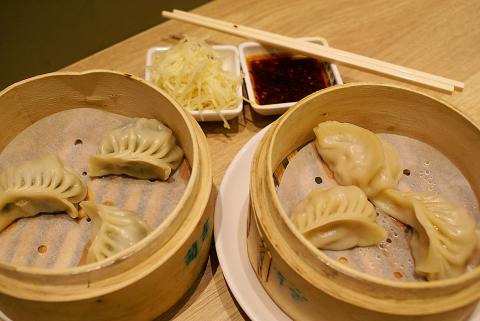
Photos: Noah Buchan, Taipei Times
On one end is an open-space dining court, where patrons linger in front of large tables after ordering from any of the 10 stalls that sell the kind of street food — fried rice noodles, shaved ice and luwei (滷味) — popular at night markets.
Surrounding the food court are sit-down restaurants that entice diners with plastic food displays in their windows. Ichi Ichi, Azabu Sabo, Tokyo Curry Espresso and Kegatsu, which all serve Japanese-style curry, shabu shabu, sukiyaki and noodles — were packed, as was Hi Sushi. Not wanting to wait in line, I settled on Kitchen Pucci, a Shanghai-style restaurant that was partially empty.
Visitors lined up to take pictures of the chefs at Kitchen Pucci. The interior is tastefully decorated with hanging ceiling lamps made from large bamboo steamers.
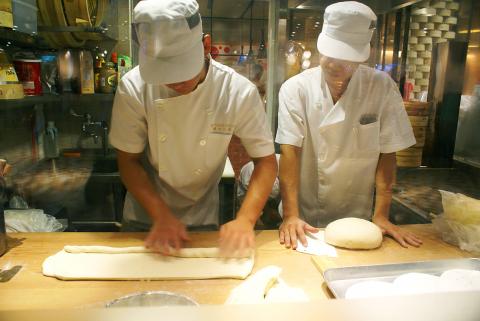
Photos: Noah Buchan, Taipei Times
Kitchen Pucci serves its dumplings dim sum style, which means they come in portions of three or six, rather than the standard 10, enabling diners to experiment with the nine different varieties. I went with three: steamed dumplings with pork (NT$120 for six, NT$50 for three), shrimp (NT$120 for six, NT$60 for three) and leek (NT$80 for six, NT$40 for three). Each order was served in its own mini-bamboo steamer with generous portions of fresh ginger.
Though the dumplings didn’t stand out from those at similar Taipei restaurants, the fried rice with pork and egg (NT$120) did. Generous strips of largely gristle-free pork were mixed in with leek, egg and long-grain white rice. With its minimal use of oil and strong flavor, it is among the best I’ve tried in Taipei. The
wontons in chili oil (NT$100) were
poorly presented, but the spicy flavor didn’t suffer as a result.
An hour later I mustered the patience to stand in line at Tsujiri. The dessert stand serves up parfaits, sundaes, floats and hot and cold drinks — all with a green tea twist. The line was long, but the 25-minute wait was still much shorter than the two-hour ordeal people put themselves through when Taiwan’s first Mister Donut opened in 2004.
The chiffon cake and soft ice cream parfait (NT$170), topped with a scoop of mashed red bean, was a triumph of taste and texture. The soft ice cream mixed nicely with the mashed potato texture of the beans and the spongelike cake, while the sweetness of the ice cream and slight bitterness of the green tea were a surprisingly tasty combination. After a few bites the long lines didn’t seem so insane.
Those hankering for Japanese-themed food or high-quality Taiwanese street snacks should try out Hankyu’s food court. You might, however, want to wait a month or two for the crowds to die down.

Many people noticed the flood of pro-China propaganda across a number of venues in recent weeks that looks like a coordinated assault on US Taiwan policy. It does look like an effort intended to influence the US before the meeting between US President Donald Trump and Chinese dictator Xi Jinping (習近平) over the weekend. Jennifer Kavanagh’s piece in the New York Times in September appears to be the opening strike of the current campaign. She followed up last week in the Lowy Interpreter, blaming the US for causing the PRC to escalate in the Philippines and Taiwan, saying that as

US President Donald Trump may have hoped for an impromptu talk with his old friend Kim Jong-un during a recent trip to Asia, but analysts say the increasingly emboldened North Korean despot had few good reasons to join the photo-op. Trump sent repeated overtures to Kim during his barnstorming tour of Asia, saying he was “100 percent” open to a meeting and even bucking decades of US policy by conceding that North Korea was “sort of a nuclear power.” But Pyongyang kept mum on the invitation, instead firing off missiles and sending its foreign minister to Russia and Belarus, with whom it

The Chinese Communist Party (CCP) has a dystopian, radical and dangerous conception of itself. Few are aware of this very fundamental difference between how they view power and how the rest of the world does. Even those of us who have lived in China sometimes fall back into the trap of viewing it through the lens of the power relationships common throughout the rest of the world, instead of understanding the CCP as it conceives of itself. Broadly speaking, the concepts of the people, race, culture, civilization, nation, government and religion are separate, though often overlapping and intertwined. A government
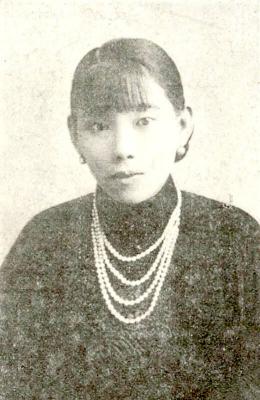
Nov. 3 to Nov. 9 In 1925, 18-year-old Huang Chin-chuan (黃金川) penned the following words: “When will the day of women’s equal rights arrive, so that my talents won’t drift away in the eastern stream?” These were the closing lines to her poem “Female Student” (女學生), which expressed her unwillingness to be confined to traditional female roles and her desire to study and explore the world. Born to a wealthy family on Nov. 5, 1907, Huang was able to study in Japan — a rare privilege for women in her time — and even made a name for herself in the